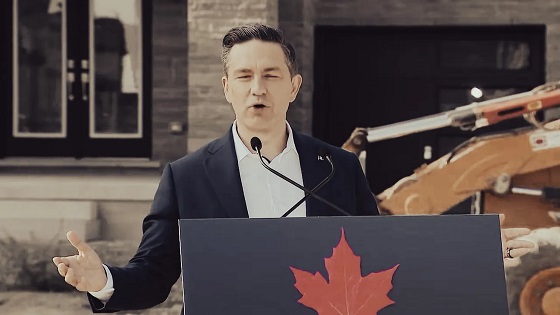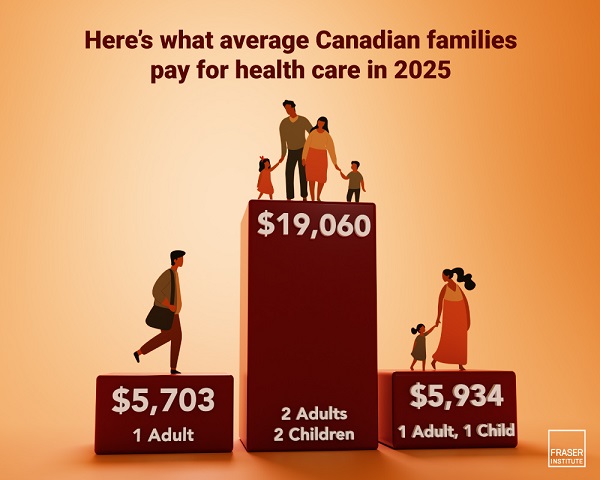Business
Median wages and salaries lower in every Canadian province than in every U.S. state

From the Fraser Institute
There’s a growing consensus among economists that the federal government and several provincial governments over the past decade have not enacted enough policies that encourage economic growth. Consequently, Canadians are getting poorer relative to residents of other countries including the United States. In particular, their ability to purchase essential goods and services such as housing and food—in other words, their standard of living—is declining relative to our neighbours to the south.
In fact, according to our new study, among the 10 provinces and 50 U.S. states, median employment earnings—that is, wages and salaries— in 2022 (the latest year of available data) were lowest in the four Atlantic provinces, followed by Manitoba, Saskatchewan, Quebec, Ontario, British Columbia and Alberta. So, the median employment earnings of workers were lower in every Canadian province than in every U.S. state.
Were Canadian provinces always in the basement? Pretty much. In 2010, while only 12 U.S. states reported higher median employment earnings than Alberta, the other nine Canadian provinces ranked among the bottom 10 places. However, the important point is that from 2010 to 2022, Canadian provinces have fallen even further behind as many low-ranking U.S. states substantially improved.
In 2010, the per-worker earnings gap (in 2017 Canadian dollars) between Louisiana, a middle-ranking state, and the nine lowest-ranked Canadian provinces varied from $4,650 (in Saskatchewan) to $15,661 (Prince Edward Island). By 2022, a typical mid-ranking state such as Tennessee was out-earning all provinces by a range of $6,770 (in Alberta) to $16,955 (P.E.I.). In other words, by 2022, not only were workers in all U.S. states out-earning workers in all Canadian provinces, the gap had grown.
Another example—Alberta and Texas are the two largest oil-producing jurisdictions in their respective countries, yet Albertans, who out-earned Texans in 2010, saw their lead of $3,423 per worker become a deficit of $5,254 by 2022.
It’s a similar story for B.C. and Washington, which are geographically proximate and have similar-sized populations. While B.C. experienced strong growth in median employment earnings per worker over this period, it still lost ground relative to Washington—the gap grew from $10,879 in 2010 to $11,311 by 2022.
The change between Ontario and Michigan is even more striking. Again, they are geographic neighbours, have similar-sized populations and share a large auto sector, with Michigan’s lead over Ontario growing from $2,955 per worker in 2010 to $8,661 by 2022. The trends are similar when comparing Saskatchewan to North Dakota or the Atlantic provinces to the New England states; the gaps have only grown larger.
So, why should Canadians care?
Of course, everybody wants to make more money, so Canadians should want to know why workers in Mississippi and Louisiana make more than workers here at home. But there’s also a broader problem—people and capital can move relatively freely across the Canada-U.S. border, meaning this growing divergence in employment earnings has significant ramifications for the Canadian economy.
It could spur the ongoing migration of highly productive individuals, including high-skilled immigrants, who choose to move south. And encourage domestic and foreign firms to invest in the U.S. rather than in Canada. If these trends continue, they will exacerbate the earnings gaps between the two countries and potentially make Canada an economic backwater relative to the U.S. There’s also a significant risk these trends could worsen if the next U.S. administration increases tariffs on Canadian exports to the U.S., effectively abrogating the North American free trade agreement.
Clearly, to mitigate this risk and reverse the ongoing divergence in employment earnings—which largely determine living standards—between Canada and the U.S., the federal and provincial governments should implement bold and sweeping growth-oriented policies to make the Canadian economy more competitive. When Canada is more attractive to business investment, high-skilled workers and entrepreneurs, all workers will reap the rewards.
Authors:
Business
Poilievre: “Carney More Irresponsible Than Trudeau” as Housing, Jobs, and Energy Failures Mount

50,000 lost manufacturing jobs, 86,000 more unemployed, soaring housing costs, and blocking every LNG project while vowing to end the TFW program
Pierre Poilievre opened his press conference with a direct attack on Mark Carney and the Liberal record on housing, framing the crisis as the product of government mismanagement rather than market forces.
He began by pointing to Conservative MP Scott Aitchison, a former mayor, as an example of what can be done when local leaders “cut the taxes and the development charges and the wait times so that building can happen.” Then came the pivot: “What a contrast with Justin Trudeau — excuse me, with Mark Carney,” he said, before slamming Carney’s choice of Gregor Robertson as housing minister. Robertson, he reminded the crowd, presided over a 149% increase in Vancouver housing costs and more than doubled homebuilding taxes. Carney, Poilievre said, rewarded that record by handing him the national housing file.
The setting itself — Deco Homes, a family-run builder founded by Italian immigrants — was chosen deliberately. Poilievre praised the Gasper family for their role in building Canada’s homes and businesses, but then asked whether such families could do the same today. His answer was no. “After a decade of Liberal taxes, Liberal spending, out-of-control Liberal immigration, reckless crime policies… the Canadian promise is really broken.”
From there, he broadened the attack. He spoke of an entire generation priced out of homeownership, of immigration growing “three times faster than housing and jobs,” of crime rising, and of what he called “the worst economy in the G7.” And then he turned squarely on Carney: “Mr. Carney is actually more irresponsible than even Justin Trudeau was,” citing an 8% increase in government spending, 37% more for consultants, and 62 billion dollars in lost investment — the largest outflow in Canadian history, according to the National Bank.
The message was simple: Liberals talk, Conservatives build. Poilievre painted Carney as a man of speeches and promises, not results. “The mistake the media is making is they’re judging him by his words rather than his deeds,” he said.
It was an opening statement designed less to introduce policy — those details came later — and more to frame the battle. For Poilievre, Carney isn’t just Trudeau’s replacement. He’s Trudeau’s sequel, and in some ways worse.
During the Q and A portion of the presser; Pierre Poilievre was pressed on immigration today, and what he said was blunt. Canada, he argued, once had the “envy of the world” system: immigrants came in at numbers the country could absorb. There were jobs, housing, health care. Everyone integrated. Ten years later? He says the Liberals have destroyed that.
The facts he used were stark. According to Poilievre, Canada is bringing in people three times faster than homes and jobs are being created. He accused the government of allowing “massive abuses” of the international student program, the Temporary Foreign Worker program, and asylum claims, with what he called “rampant fraud” right under Ottawa’s nose.
He tied this directly to the economy: youth unemployment, he said, is the worst in three decades. At the same time, employers are importing more temporary foreign workers than ever, this year at a record high and using them for cheap labor under poor conditions. His line: “While our young people can’t find jobs, employers are able to exploit temporary foreign workers by giving them lower wages and terrible working conditions.”
But here’s the part that stands out politically. Poilievre said, “Immigrants are not to blame.” He put the responsibility squarely on Liberal governments, calling their immigration numbers “reckless and irresponsible.”
His fix? End the Temporary Foreign Worker program. Cut immigration levels back to “the right numbers and the right people” to fill jobs Canadians can’t do. Tighten border standards to keep criminals out. And, in his words, “always and everywhere put Canada first.”
Pierre Poilievre didn’t hold back when asked about Mark Carney’s record. His words: “Mr. Carney is actually more irresponsible than even Justin Trudeau was.” That’s not a throwaway line, he backed it with numbers.
According to Poilievre, Carney inherited what he called a “morbidly obese government” from Trudeau and made it worse: 8% bigger overall, 37% more for consultants, and 6% more bureaucracy. He says Carney’s deficit is set to be even larger than Trudeau’s.
Then the jobs number: 86,000 more unemployed people under Carney than under Trudeau. That, Poilievre argued, is the real measure, not the polished speeches Carney gives. His line: “The mistake the media is making is they’re judging him by his words rather than his deeds.”
He also went after Carney for what hasn’t happened: “He has not approved a single major national project.” Meanwhile, Poilievre says food price inflation is even worse today, crime policy hasn’t changed the same “catch and release” approach and every big promise Carney made has already been broken.
Pierre Poilievre was asked about Ukraine, and his answer wasn’t about speeches or handshakes in Brussels. It was about pipelines.
“The best way to put Canada first while helping Ukraine is to sell our oil and gas in Europe.” His argument: Vladimir Putin bankrolls his war because Europe still buys his fuel. Poilievre said if Canada had built the Energy East pipeline, we’d be shipping a million barrels of oil a day to Europe right now.
He went further: approve LNG plants immediately, liquefy tens of billions of dollars of Canadian gas, and ship it overseas to “fully displace” Russian sales. His line: “Instead of the money going to Putin’s war machine, it will go to the trades workers in this country.”
And then the indictment of the Liberals: “Mark Carney and the Liberals have blocked every single LNG project that has been put before them. As a result, we only have one plant and it was approved by Stephen Harper.”
So the contrast is stark. Carney talks about climate virtue. Poilievre says: build pipelines, sell fuel, kill Putin’s war economy, and pay Canadian workers. His closer: “That is how you put Canada first.”
Final Thoughts
So let’s just be honest. Under Mark Carney’s leadership, the numbers aren’t just bad they’re devastating. In a matter of months, Canada has lost 50,000 manufacturing jobs. These are not low-skill jobs; they are the backbone of the economy, the kind of work that built the middle class in this country. Add to that another 86,000 unemployed overall compared to when he took office. This is what Carney calls stability.
Now, if you’re a Temporary Foreign Worker, life looks pretty good. Ottawa has built an entire system around you cheap wages, little recourse, and companies happy to import you as disposable labor. If you’re a Carney insider, it looks even better. The government is 8% bigger than when Trudeau left, consultants are raking in 37% more, the bureaucracy is swelling. It’s one of the greatest insider rackets in modern Canadian politics.
But if you’re part of Canada’s middle class, if you’re a young person trying to buy a home, if you’re a worker trying to hold onto a job in a plant, a mill, or a construction site you are being hollowed out. You’re watching your wages stagnate, your housing costs explode, your jobs disappear overseas or into government-mandated “green transitions.” And when you ask for answers, what do you get? You get Patty Hajdu telling you not to be afraid of robots. You get Mark Carney telling you his deficits are “investments.” You get speeches about “climate virtue” and “AI literacy” while your livelihood collapses.
That’s the contrast Poilievre is trying to draw. On immigration, he says: let’s end the Temporary Foreign Worker scam, bring people in at a pace we can actually house and employ, and put Canadian workers first. On energy, he says: build the pipelines, approve the LNG projects, and stop funding Putin’s war by leaving Europe dependent on Russian fuel. On the economy, he says: stop measuring success by the size of government or the smoothness of a prime minister’s speeches, and start measuring it by the number of Canadians who can work, buy homes, and raise families in their own country.
So the choice is simple. Carney offers more of the same consultants, insiders, deficits, slogans, and the slow managed decline of a once-prosperous nation. Poilievre is offering something completely different: a chance to reverse the hollowing out of the middle class and to put Canadian jobs, Canadian energy, and Canadian sovereignty first.
If you’re an insider, Carney’s Canada works just fine. If you’re a middle-class Canadian, it’s a disaster. And that, in the end, is the dividing line in this country.
Subscribe to The Opposition with Dan Knight .
For the full experience, upgrade your subscription.
Business
Health-care costs for typical Canadian family will reach over $19,000 this year

From the Fraser Institute
By Nadeem Esmail, Nathaniel Li and Milagros Palacios
A typical Canadian family of four will pay an estimated $19,060 for public health-care insurance this year, finds a new study released today by the Fraser Institute, an independent, non-partisan Canadian public policy think-tank.
“Canadians pay a substantial amount of money for health care through a variety of taxes—even if we don’t pay directly for medical services,” said Nadeem Esmail, director of health policy studies at the Fraser Institute and co-author of The Price of Public Health Care Insurance, 2025.
Most Canadians are unaware of the true cost of health care because they never see a bill for medical services, may only be aware of partial costs collected via employer health taxes and contributions (in provinces that impose them), and because general government revenue—not a dedicated tax—funds Canada’s public health-care system.
The study estimates that a typical Canadian family consisting of two parents and two children with an average household income of $188,691 will pay $19,060 for public health care this year. Couples without dependent children will pay an estimated $17,338. Single Canadians will pay $5,703 for health care insurance, and single parents with one child will pay $5,934.
Since 1997, the first year for which data is available, the cost of healthcare for the average Canadian family has increased substantially, and has risen more quickly than its income. In fact, the cost of public health care insurance for the average Canadian family increased 2.2 times as fast as the cost of food, 1.6 times as fast as the cost of housing, and 1.6 times as fast as the average income.
“Understanding how much Canadians actually pay for health care, and how much that amount has increased over time, is an important first step for taxpayers to assess the value and performance of the health-care system, and whether it’s financially sustainable,” Esmail said.
The Price of Public Health Care Insurance, 2025
- Canadians often misunderstand the true cost of our public health care system. This occurs partly because Canadians do not incur direct expenses for their use of health care, and partly because Canadians cannot readily determine the value of their contribution to public health care insurance.
- In 2025, preliminary estimates suggest the average payment for public health care insurance ranges from $5,213 to $19,060 for six common Canadian family types, depending on the type of family.
- Between 1997 and 2025, the cost of public health care insurance for the average Canadian family increased 2.2 times as fast as the cost of food, 1.6 times as fast as the average income, and 1.6 times as fast as the cost of shelter. It also increased much more rapidly than the average cost of clothing, which has fallen in recent years.
- The 10 percent of Canadian families with the lowest incomes will pay an average of about $702 for public health care insurance in 2025. The 10 percent of Canadian families who earn an average income of $88,725 will pay an average of $8,292 for public health care insurance, and the families among the top 10 percent of income earners in Canada will pay $58,853.
-

 Crime2 days ago
Crime2 days agoAlleged Killer Of Charlie Kirk Caught
-

 Alberta2 days ago
Alberta2 days agoProvince urging post secondary students to apply for loans, grants, scholarships, bursaries and awards
-

 Business2 days ago
Business2 days agoPoilievre: “Carney More Irresponsible Than Trudeau” as Housing, Jobs, and Energy Failures Mount
-

 Crime2 days ago
Crime2 days agoConservative speaker and celebrity Charlie Kirk shot during Q & A event at Utah Valley University
-

 Opinion2 days ago
Opinion2 days agoThe Charlie Kirk I Knew
-

 Crime1 day ago
Crime1 day ago‘Dark Moment For America’: Trump Addresses Nation After Kirk Assassination
-

 Crime2 days ago
Crime2 days agoCharlie Kirk ASSASSINATED
-

 Bruce Dowbiggin18 hours ago
Bruce Dowbiggin18 hours agoKirk’s Killing: Which Side Can Count on the Military’s Loyalty Now?











